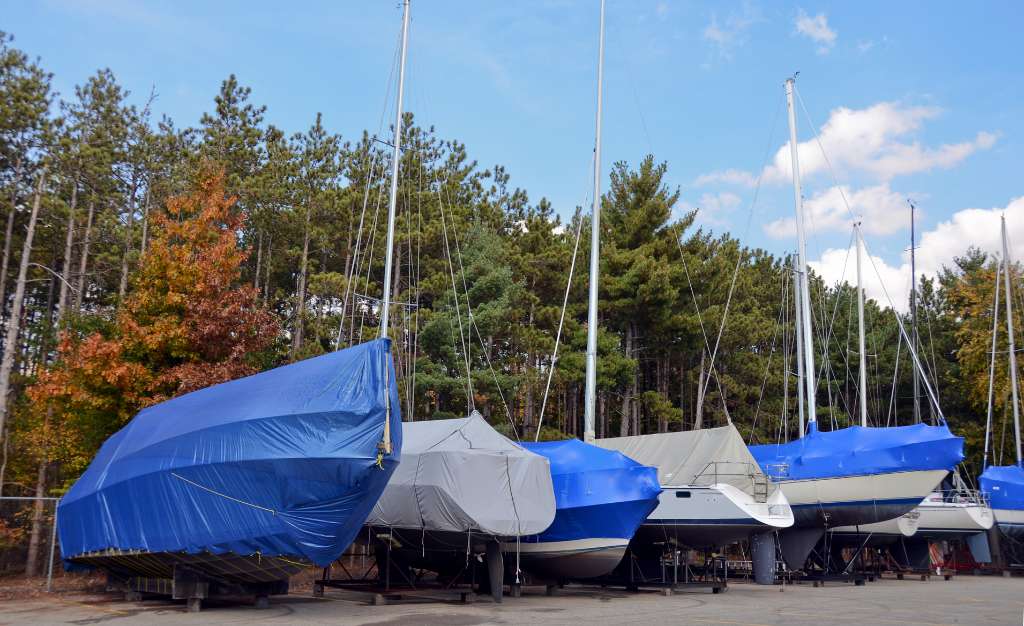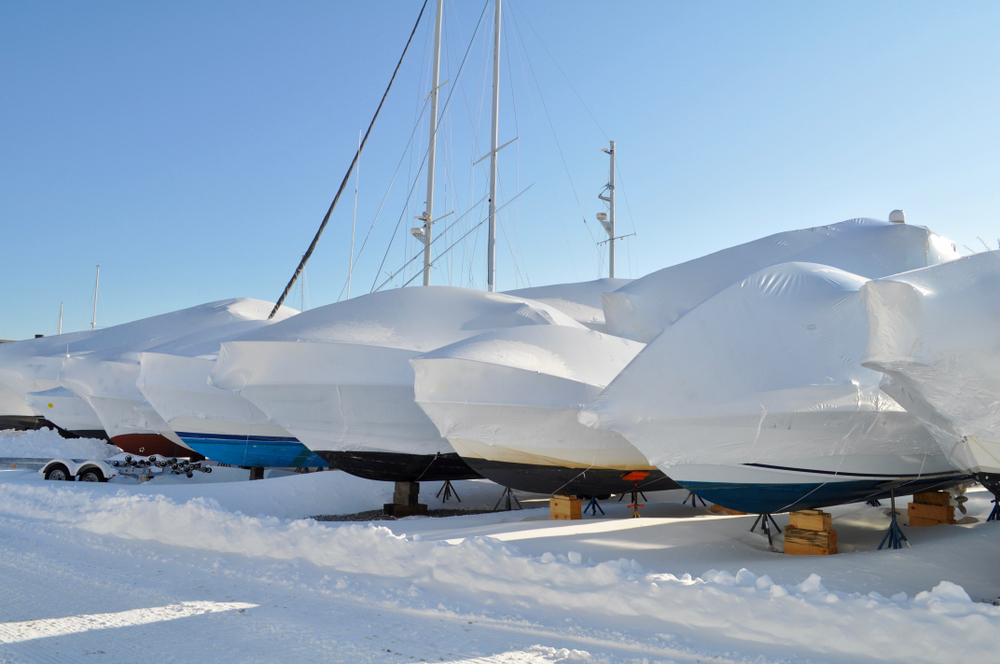Think again if you plan to wait for spring to get professional help, as it’s the busiest time for boat mechanics. Therefore, as the saying...
Winter Boat Storage Tips: How to Store Your Boat This Winter
Post by Team Dockwa - Published on 08/25/23 17:55 PM

If you live in a climate that doesn’t accommodate cruising in the wintertime, you’ll probably have to find a place to safely store your boat during the off-season. Proper winter boat storage is vital to keep your vessel protected and ensure you can get back to cruising safely when the weather warms up.
Keep reading to learn about your options for winter storage, the best way to store your boat in the winter, and answers to common questions about proper boat storage.
Navigate this post:
- Winter boat storage options
- What is the best way to store a boat in the winter?
- Winter boat storage FAQ
Winter boat storage options
If you own a boat and plan to store it for the winter, you’ve got a few options.
Boat storage options in the winter include:
Wet storage
If you live in a warm climate with relatively mild winters, you can leave your boat in the water all season. This is a convenient option because it prevents you from having to move your boat back and forth, but it also leaves your boat susceptible to the elements, especially if you don’t plan on using it during the winter season.
If you live in a colder climate, you may still be able to leave your boat in the water as long as you completely winterize it and add an agitator (ice eater) to prevent the water from freezing around the boat.
Outdoor boatyard storage
Storing your boat at a marina or boatyard’s outdoor dry storage facility is a popular and relatively affordable option. While it may cost more than storing your boat at home, it is generally more affordable than dry rack or indoor storage.
Keep in mind you’ll need to make sure the boat is protected by doing one or more of the following:
- Shrink wrapping it
- Storing it under a canopy
- Securely covering it

Indoor dry storage & dry racks
Some marinas have enough space for indoor dry storage, which protects vessels from the elements without requiring shrink wrapping or other coverings.
Dry rack storage is a type of boat storage where vessels are placed on tall racks with a forklift. Marinas with indoor dry racks will pick up your boat with the forklift and stack it on a shelf amid other boats in a climate-controlled indoor facility.
Indoor dry storage and dry racks are generally the most expensive option, but they do offer maximum protection.
Home storage
If you have a trailer, you can store your boat in your garage, yard, or self-storage facility throughout the season.
This is an affordable option that allows you to more easily access your boat all winter. Plus, you get the perks of being able to keep an eye on your boat and work on it from the comfort of home.
However, home storage may be inconvenient because:
- Your boat takes up space in your yard or garage.
- You’ll still have to transport your boat yourself.
- You won’t get the perks and amenities that many boatyards and marinas with dry storage offer, like commissioning services, trickle electric, and occasional checks on the boat.
What is the best way to store a boat in the winter?
The best way to store a boat in the winter is to store it indoors or outdoors at a reputable marina or boatyard.
Many marinas, like Brick Cove Marina on the North Fork of Long Island, New York, offer secure winter boat storage options as a convenient alternative to storing your boat on your own property. Brick Cove, for example, has eight acres of outdoor storage space complete with a hydraulic forklift to easily and safely maneuver vessels.
Deanna Horton, dockmaster of Brick Cove Marina, recommends searching for marina boat storage in the winter if:
- You want the convenience of someone else keeping an eye on your boat during the off-season.
- Your go-to marina in the summer doesn’t accommodate winter storage.
- You want to pass off the work of decommissioning and commissioning your boat to someone else.

Boats stored in the winter at Brick Cove Marina on Long Island, NY.
Home storage vs. marina & boatyard storage
If you have a garage or dedicated space to store your boat yourself, you’ll certainly enjoy the cost-savings of keeping your boat at home. Plus, if you plan to work on your boat at all during the winter months, it’ll be conveniently located right at home all season.
But keep in mind that storing your boat at a marina or boatyard offers additional conveniences while protecting your boat and saving you time.
Storing your boat at a marina or boatyard in the winter is a great idea because:
- It ensures that trusted professionals have eyes on your boat daily.
- You can store your boat at the same facility where you store it in the summer.
- The marina may launch your boat from dry storage to the water when you’re ready to start cruising in the summer.
- You don’t need to transport your vessel yourself.

A boat in Brick Cove Marina's heated barn.
Boat storage for winter at a marina or boatyard may also come with added perks and services that you wouldn’t get by keeping your boat at your home or in a storage unit for boats.
For example, Brick Cove Marina offers its winter storage customers:
- Seasonal commissioning and decommissioning
- Year-round availability — meaning staff are on-site all winter long, so boats are constantly checked and monitored
- Jack stand monitoring
- Battery charging
- Trickle electric
- Priority on the waitlist for a summer slip
- A heated barn for winter work
Winter boat storage FAQ
Read on for answers to the most common questions about storing your boat in the winter.
- Should you leave gas in your boat over winter?
- How much does winter boat storage cost?
- How long can a winterized boat be stored?
- How do you prepare a boat for outdoor winter storage?
Should you leave gas in your boat over winter?
Yes, most experts recommend that you leave gas in your boat over the winter if you won’t be using it. In fact, it’s recommended that you fill your tank with gas that’s been treated with a fuel stabilizer.
For best results, use a fuel stabilizer recommended by your engine manufacturer. Treated fuel will remain stabilized for up to one year.
Pro tip: Run your engine for 10 minutes to distribute the treated gas through your fuel system and engine before putting your boat away for winter storage.
Is it better to store a boat full or empty of gas?
There is debate over which is best, but most experts agree that if you can’t empty the tank completely, it’s best to fill the tank with gas and treat it with fuel stabilizer.
How much does winter boat storage cost?
The cost of winter boat storage ranges from a few hundred dollars for outdoor storage to thousands of dollars for indoor dry rack storage. To roughly estimate your storage costs, assume you’ll pay at least $50/foot of boat for adequate storage.
Factors that impact the cost of winter storage include:
- Size of boat
- Type of boat
- LOA
- Your location
- The type of storage you opt for (wet vs. dry, indoor vs. outdoor)
How long can a winterized boat be stored?
A winterized boat can be safely stored for about one year. However, some boaters have successfully stored winterized boats for two or more years.
But keep in mind that you’ll want to check your winterized boat for dry rot in rubber parts like:
- Hoses
- Impellers
- Engine primer bulbs
How do you prepare a boat for outdoor winter storage?
- Clean the boat. Scrub the decks. Flush out the livewell. Prevent mold and mildew by treating seats and wood trim. Remove life jackets and towels and check all storage areas for dirt, water, and grime.
- Fill up your tank and add fuel stabilizer. Top off your fuel tank (but leave a little bit of space for expansion and contraction). Add a fuel stabilizer to prevent the gasoline from oxidizing.
- Change the oil. Changing the oil and filter will prevent rust and corrosion.
- Remove and charge the battery. Store the battery away from freezing temperatures. Charge it fully before storing your boat, then charge it once a month throughout the season. Alternatively, you can put the battery on a trickle charger.
- Change gear lube. Your outboard motor’s lower unit has a lubricant that must be drained and refilled before putting your boat away for the winter.
- Cover your boat. Whether you opt for a simple tarp, a custom cover, or shrink wrapping, make sure your boat is covered to protect it.

Boats being stored at Brick Cove Marina.
Winter storage takeaways
- You have four main options for winter boat storage: Wet storage, self-storage, outdoor dry storage, and indoor dry storage or dry racks.
- The best way to store your boat in the winter is to leave it at a trusted marina or boatyard.
- Prepare your boat for winter storage by cleaning it, filling the gas tank with treated fuel, charging the battery, changing the oil, changing the gear lube, and covering the boat.
And if you find yourself in the North Fork of Long Island, be sure to stop by Brick Cove Marina to enjoy its historic grounds and rustic charm.
Locals should also consider Brick Cove Marina for their winter storage needs. Through September 15, 2023, new customers who secure winter storage by paying in full will get 10% off — so inquire today!





